A webinar was held on 17th February, 2022 on “European-Pakistan Relations” under the auspices of the Karachi Council on Foreign Relations (KCFR) with Her Excellency Ms. Androulla Kaminara, Ambassador and the Head of the Delegation of the European Union to Pakistan. Chaired by Mr. Ikram Sehgal, Chairman KCFR, the event was moderated by Ambassador Mustafa Kamal Kazi, Vice Chairman KCFR.
The transcript of the webinar is as under:
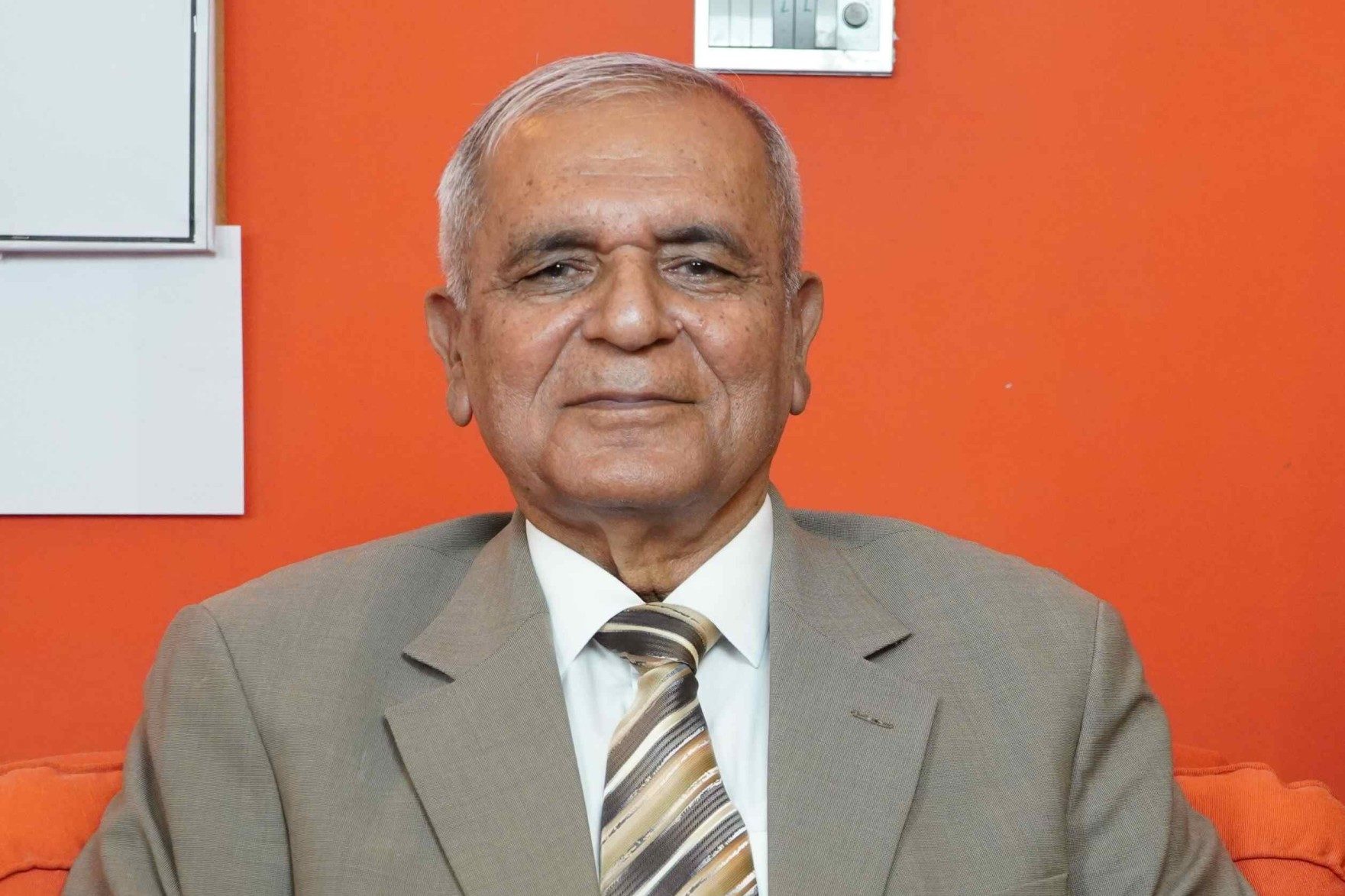
Mr. Sadeed Malik: I am Commodore Sadeed Malik, the Chief Executive Officer and Secretary General of Karachi Council on Foreign Relations. You all are very well introduced to the Council on Foreign Relations. We have been holding seminars and webinars after COVID, and today’s topic is Pakistan – European Union Relations. There could not be anyone better than the messenger of European Union, Her Excellency, Ms. Androulla Kaminara to tell us about it. There could be no better person than our moderator for today, Mr. Mustafa Kamal Kazi, who has been our ambassador to a number of European countries, including Russia, the Netherlands, Iraq and Indonesia. Concurrently, he has represented Pakistan in a number of international organizations for the prevention of chemical weapons, UNESCO, etc. In today’s webinar, all participants are requested to mute their microphones until requested to unmute by the moderator. May I now request Ambassador Mustafa Kamal Kazi to moderate today’s webinar.
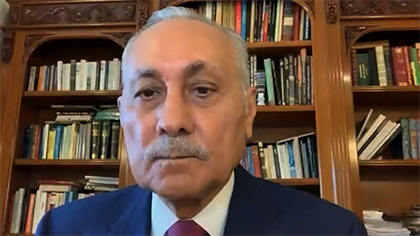
Ambassador Mustafa Kamal Kazi: Thank you very much. Good morning, ladies and gentlemen. We are indeed honored to have with us the Ambassador of the European Union Ms. Androulla Kaminara.
She took up her assignment in Pakistan in September 2019. She has a remarkable career profile; before her assignment in Pakistan, Ambassador Androulla Kaminara has held senior positions in the European Commission, looking after its humanitarian aid operations and international cooperation and development programs. She has also served as the head of European Commission representation in Cyprus. She has been European Union fellow at the European Union Study Center at Oxford University. Before joining European Commission, Ambassador Kaminara was Special Adviser to two Cabinet ministers in her country, Greece. We are very pleased to welcome you Ambassador Kaminara to the Karachi Council for Foreign Relations. Next time, we hope to have you with us in person in Karachi sometime in future.
We will start with your briefing on EU-Pakistan relations, and perhaps EU’s global role followed by Q&A session. But before I pass on the floor to you, I would like to highlight how much we in Pakistan value and cherish our outstanding, multifaceted relationship with the European Union, and bilaterally with all its member states. Trade remains an important feature of Pakistan’s relations with EU. The EU is Pakistan’s first or second most important trading partner depending which side figures you rely on. It accounted for more than 14% of Pakistan’s total trade in 2020 and absorbing 28% of Pakistan’s total exports. The European Union has provided more than 1.3 billion Euros for projects and programs in Pakistan. Since the grant of GSP plus in 2014, Pakistan’s export to European Union have enhanced from 4.5 billion Euros in 2013 to 7.4 billion Euros in 2019, registering an increase of 65%, which is a quite a large figure. So naturally, the resolution adopted by the European Parliament last year for recommending withdrawal of Pakistan’s GSP plus status on human rights grounds has caused us considerable concern. Since Karachi Council on Foreign Relations membership includes a sizeable number of businessmen, your views on future prospects of the GSP scheme would be of considerable interest to us. Secondly, European Union’s geographical proximity and long-standing historical ties with Asia and Africa make it a distinctive player in the international system. As the largest donor of development assistance in the world, it has inherent strategic advantage to play a constructive balancing role in an increasing polarized multipolar global dispensation we see today. We would therefore be interested to know how EU is looking at this global role particularly in the context of situation in our region and beyond. With these remarks I pass on the floor to you, Ambassador. Thank you!
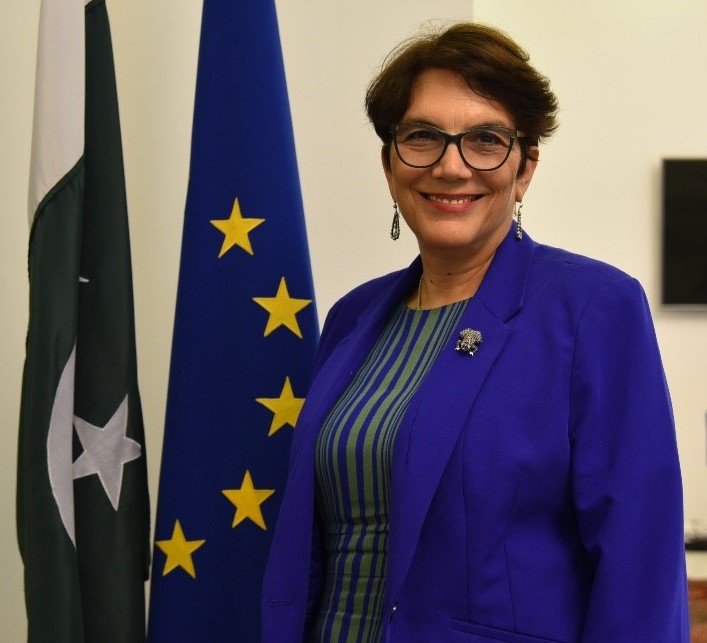
H.E. Androulla Kaminara: Thank you very much Ambassador Kamal. Thank you very much Mr. Sadeed. It’s an absolute honor and pleasure to be addressing you today. I do look forward to potential future meeting face-to-face. It’s important to have the face-to-face meetings and not just zooms which have become part of our lives recently, but nonetheless, we’re doing the best we can in the current context. And thank you for also, presenting not only my career but also presenting what you would like to focus more in this presentation. I have prepared some slides, depending on the basis of what you have said you are more interested in, I would go slower or faster in the presentation. My presentation basically has two parts. One is more focused on, what is the European Union’s aims, what are our objectives, and then looking to what is the European Union doing in Pakistan. Because I think you have to have the general before you go into the specific. So this is the structure we have today, but just keep in mind that there will be two parts. One, the general of the EU, and in the second part, we focus on Pakistan alone.
So the European Union, it’s a unique economic and political union between 27 member states. Of course, we lost UK after Brexit. The very first steps of the European Union started after the Second World War. I think it’s important to keep in mind the logic of creating a union between former enemies in Europe and former enemies that fought two World Wars and where so many lives were lost, is absolutely fundamental to what the European Union is doing both internally and also, what the European Union is trying to project throughout the world- which is cooperation rather than aggression. Cooperation can only give benefits to both sides.
So what are the goals of the European Union? As I’ve just hinted, that first and foremost is to promote peace, both within and outside the European Union. In the world, it is to establish economic, and monetary system to promote inclusion and combat discrimination, break down barriers to trade and borders that’s why we have the common market, encourage technological and scientific developments this is something that over the last ten years has become even more important to promote and champion environmental protection and promote goals like the competitive global market. Our values human dignity, freedom, democracy, equality, rule of law, and human rights and that we practice both internally and externally. We can go into the details further down how exactly we practice this.
It’s a complex set of institutions and bodies, but I would say, the core institutions are the European Council representing the member states’ governments. The European Parliament, which represents the citizens of the EU. European Commission, which is the machinery behind all the new legislation of the EU. The Council of the European Union, which meets in the format of specific ministers from all the member states. For example, there is an Agricultural Council, there is a Council of Foreign Ministers and we have the Court of Justice, the European Central Bank, the European Court of Auditors and a series of other bodies, which are important. But for the purposes of being brief, I will leave it at that.
Now the leadership we have Charles Michel who is the president of the European Council, so he chairs the meetings with the Heads of State of the 27 member states. For the first time, we currently have a woman Ursula von der Leyen, the president of the European commission. For the first time also, not the first woman president of the European Parliament, but the first time that we have both women presidents. We also have HRVP High Representative and Vice President of the European Commission, Josep Borrell, who is also the head of the External Action Service, where all delegations throughout the world report.
The competences, this is also very important to understand although it’s quite a complex system. There are certain areas where it is an exclusive competence of the European Union. So for example trade and common commercial policies and exclusive competence of the EU. That is why member states do not have bilateral trade agreements, but all member states’ trade agreements are under the EU umbrella. In fact, after the UK left, the UK moved away from about 100 bilateral trade agreements, which the UK was a part of, because it was a member of the European Union, and now the UK is trying to renegotiate those trade agreements. Certain topics are under shared competences, like consumer protection, energy, public health. There are competences where the EU can take actions to supplement the actions of the member states and certain things are the competence of the member states. Employment and social policies, for example, are the competences of the member state. So there is a complex system of who does what, but there’s also a logic behind it that decisions are taken at the lowest possible level to make them efficient.
For each financial cycle, we have concrete priorities. We work on seven year budgets. So we’re currently on the seven years budget cycle of 2019-2024. You see here what the priorities are, the Green Deal, that the economy works for everybody.

Europe is fit for the digital age, that means that we empower people in Europe for new generation of technologies. Promoting the European way of life – which I underlined here – the European way of life is one that does not only look at, let’s say the Christian way of life or the non-Christian way of life, but looks at every culture. The plethora of the different ways of life that exists in Europe and we actually celebrate that. Let me just say that there are 23 million Muslims living in the European Union and they’re very much valued and part of what the European way of life is. We promote the stronger Europe in the world and we also promote democracy, both internally and externally in Europe.
Promoting the protection of environment and the reduction of CO2 emissions is very much core to the current priorities of the EU. I’d just like to say that the EU has already declared that by 2030, it is committed to cutting emissions by at least 55%. We are at the forefront of taking action to protect the environment and that is not only important for us but I think for the whole world. Protection of the environment is very much one of the areas we discussed with all our partners throughout.
I’ve included this slide which refers to recent developments in the EU with respect to a recent policy objective of the EU which is to create the strategic compass. I have to say that this is something that has been evolving over the years, but the push for strategic compass has also been accelerated recently, following a lot of international events, including what happened in Afghanistan.
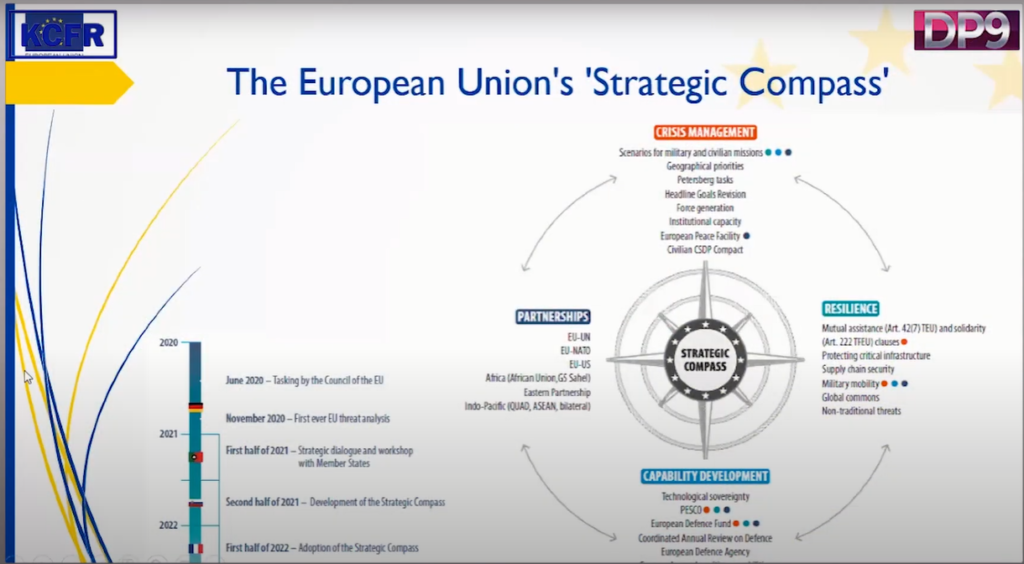
The language that we’re using vis-à-vis the strategic compass is pretty bold. Basically we have realized that in order to have a strategic relevance we have to take some actions in order to have EU capabilities in addressing some of these international challenges. There was a risk that if we didn’t take these actions we would always be principled, but in the long run we would probably seldom be relevant, because coordination with others across the world for actions to take place would normally mean that we react slower than we should. Just a few figures to explain what the logic behind that is.
A few decades ago the EU was about one quarter the EU economy was represented about one quarter of the world’s GDP. In 20 years we are expected to represent about 10 percent of the world’s GDP. Europe has also been experiencing low birth rates so by the end of this century we’re expected to be about five percent of the global population. So it is necessary to work together on the four areas that you see here. On the one hand to increase the partnerships that we have with global major players. From what the EU does with the UN but also with NATO. It is also important that we have better capabilities for crisis management. What happened with the COVID situation the last few years has also put on the agenda, the need to have better coordination when major crises happen in the world, both internally and externally for the EU to independently be able to respond. We need to ensure that we are more resilient in our own security capabilities. We have capabilities for the EU to react independently to world events. We have a Common Foreign and Security Policy. It is based on the UN charters. We believe in non-proliferation and disarmament.

I think this is not widely known that we have ten EU Civilian Common Security and Defense Policy missions in Europe, in Africa, and the Middle East, and over 2000 personnel that have been involved in these missions over the last years.

This is a quick map of all these CSDP missions. One that is of particular relevance to Pakistan is the Atlanta mission. You would see it off the East coast of Africa. Basically it is a mission that was started in order to ensure that WFP which is the World Food Program could deliver aid to Somalia, and those ships could be protected from piracy. There has recently been discussions with Pakistan, for potentially joining in this. You see other countries including Central African Republic in the Sahel, in Mali, in Niger and in other parts of the world.
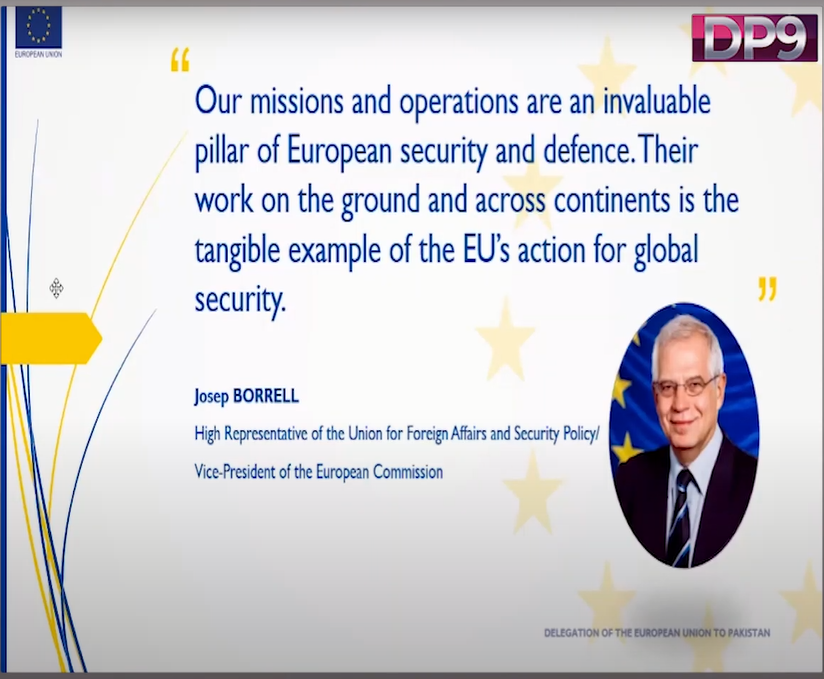
Now this is a quote from my boss in a way, he is the boss of every EU ambassador in the world. Josep Borrell, who says “Our missions and operations are an invaluable pillar of European security and defense. Their work on the ground and across continents is the tangible example of the EU action for global security.” In December, 2021 Foreign Minister Qureshi was in Brussels and we had a very long and successful meeting and dinner with HRVP Borrell. Of course, the currency that most member states are using, 19 EU member states are using the Euro, which recently celebrated 20 years since its launching. This is quite an amazing initiative of the EU. I do remember when the euro was going to be launched, there were discussions about whether would it be successful, would it be possible to have one currency? Well 20 years down the line you seeF the figures here, the euro is the second most important currency in the world. Our population is about 10 percent of the world population despite the fact that potentially our economy is somewhere between less than 20 percent of the world economic current. So this is one of the very successful projects and initiatives of the EU.
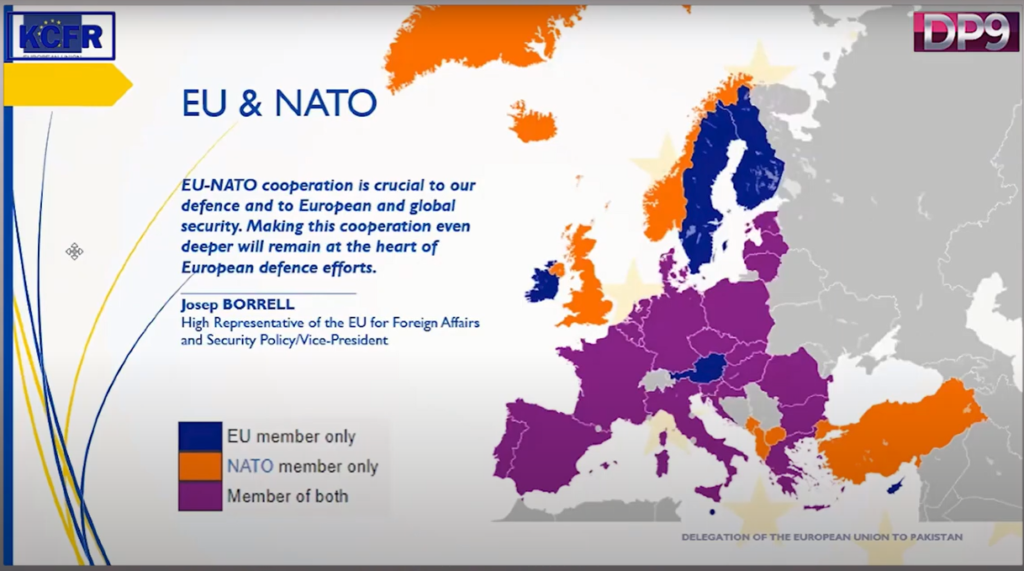
EU and NATO if we’re talking about partnerships with others, it’s important also to see here that certain EU member states are just EU members, they’re not members of NATO. The UK is a NATO member but not a member of the EU, because this is a map that needs to be updated and some member states are both members of the EU and NATO.
So this is the first part of my presentation on the general context of what is the EU. Now let me quickly go into EU-Pakistan and what we’re doing here because I’d like to give time for questions.
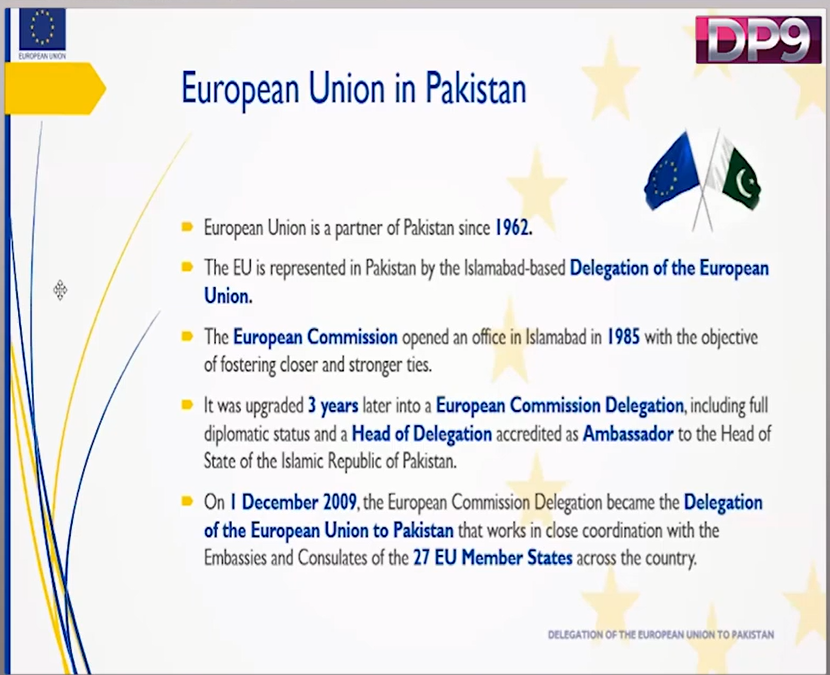
Just to say that this year we’re celebrating 60 years of diplomatic relations with Pakistan, we’re in the process of launching a number of activities to celebrate that.
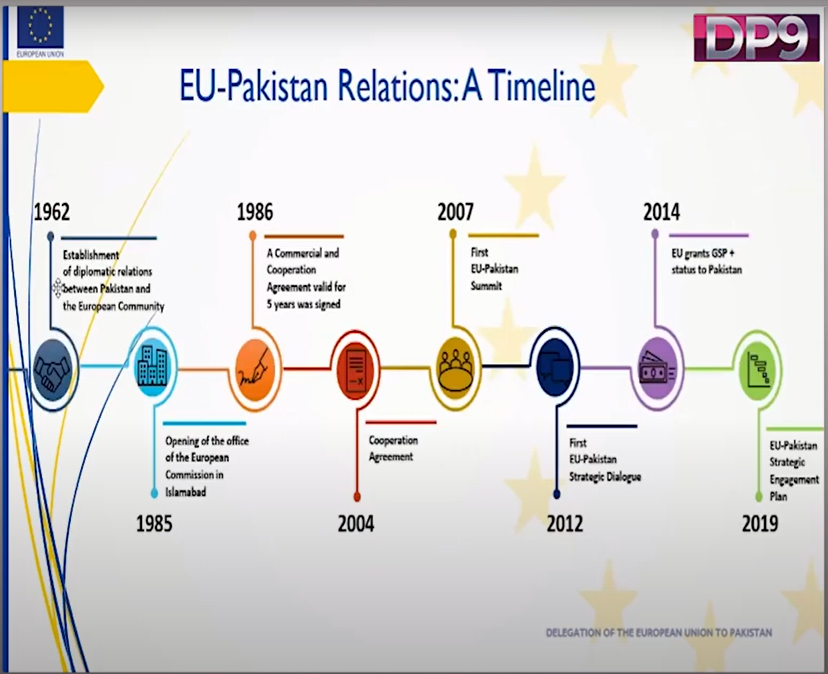
This is the timeline of the EU relations. I think notable point in this timeline is 2014 when the EU grants GSP Plus status to Pakistan, and also summer of 2019, when the EU and Pakistan signed the Strategic Engagement Plan. It was signed by Foreign Minister Qureshi and the then HRVP Federica Mogherini took place in Brussels.
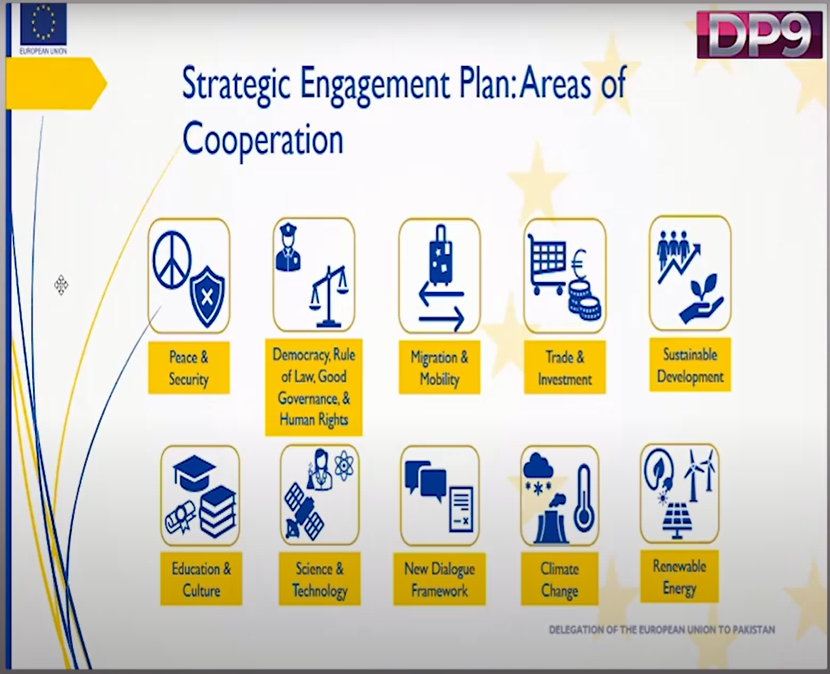
Now this strategic engagement plan, for the first time put everything that we do between EU and Pakistan under one umbrella. This document included all the previous cooperation areas between EU and Pakistan but also introduced new ones. So on the top line you will see the things we were doing before 2019. Peace and security, we’re always cooperating on democracy, rule of law, migration, trade and sustainable development. The document also introduced things like corporation in education and culture, science and technology, a new dialogue framework for our security, climate change, and renewable energy.
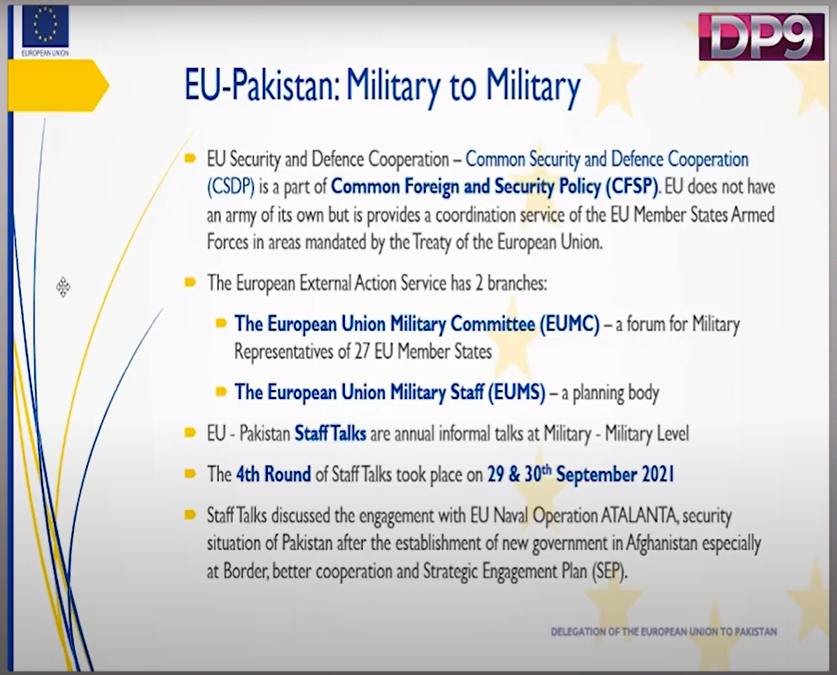
In that context, we also have EU-Pakistan military to military cooperation. The EU and Pakistan have staff talks. The last one took place in the end of September. As I mentioned before, you see here that there is discussion on a possible cooperation between Pakistan and by Pakistan in the EU operation Atlanta. We also work with Pakistan on issues of counterterrorism and non-proliferation, these are ongoing activities.
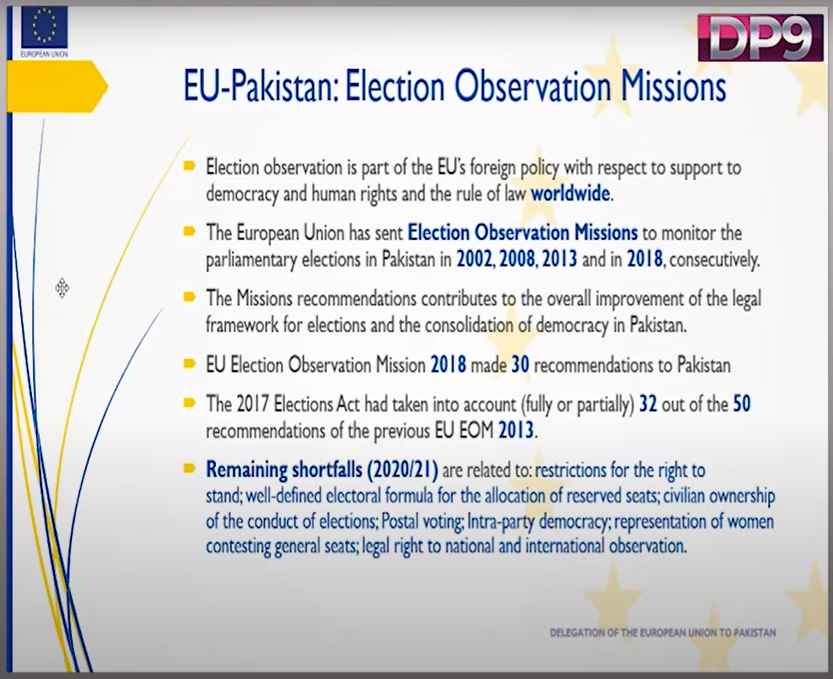
We have been observers in the elections in 2002, 2008, 2013 and 2018. This is a very important aspect of what we do with Pakistan. Each time that we participate in election observations, we also draft a report which says that on the basis of experience of the previous elections, monitoring a series of improvements have to take place in the country concerned. There’s always a mid-term mission between the election observation and the next elections, where observers come here to see the progress of those reforms. The remaining shortfalls are also the percentage of representation of women contesting in general elections, there are also issues of transparency and reporting by the press upon elections.
Now one of the points that you wanted to focus more on was on GSP plus. You have here, the overall figures, they show that EU is the biggest destination of Pakistani products. About one third of what you export goes to the EU. The second destination is the US, and third is China. I put it here because when we’re talking about total trade, we are second but the part of the trade equation that benefits Pakistan the most is the part of Pakistani goods getting to the EU. There we are by far the biggest destination.
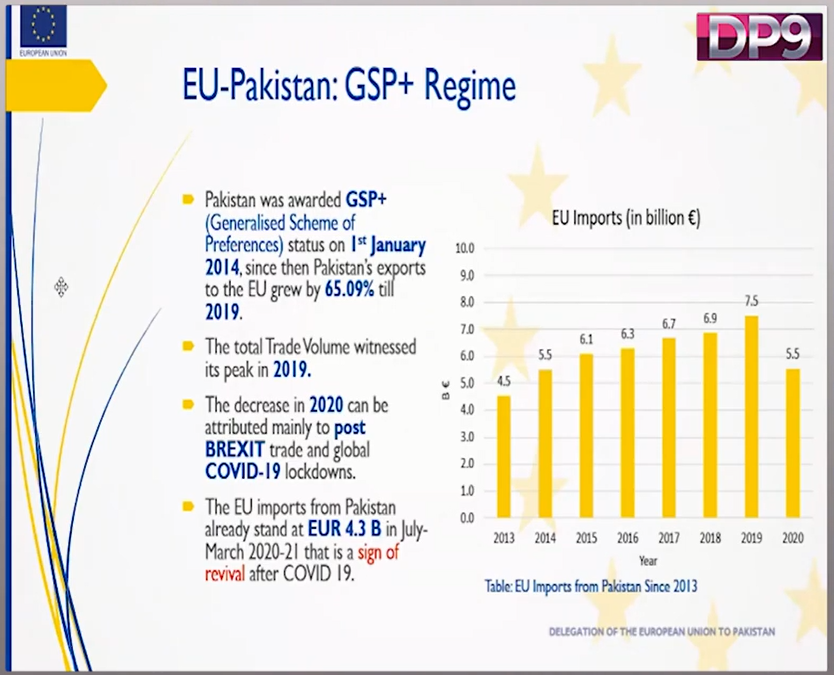
Here you see the evolution of the exports from Pakistan since 2014 when GSP plus was granted to Pakistan. Of course we had a slight dip in last year in 2020 due to COVID but I have to congratulate Pakistan because in 2021 the Pakistani exporters very quickly managed to turn their attention to markets that other countries used to cover and not only picked up the dip in the exports due to COVID but increased their share of exports even further.
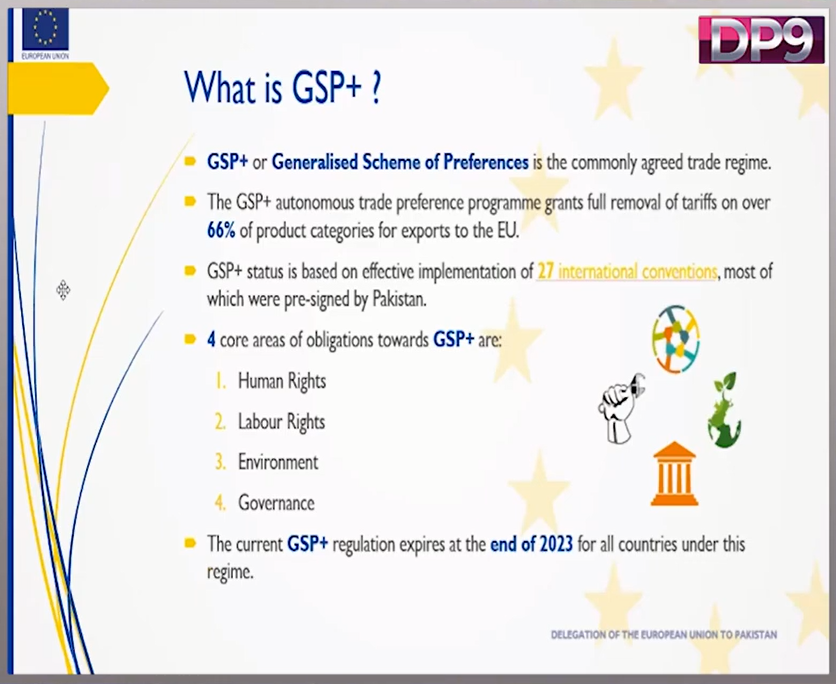
What is GSP plus? I assume most people would know but I just want to focus on the four core areas or obligations towards GSP plus which are human rights, labor rights, environment and governance. There was also a mention about the resolution that the European Parliament passed in end of April last year. Let me say a few things about our resolution, first that the resolution went to the plenary of the European Parliament because it was mainly focusing on two individuals that were in jail on blasphemy charges, which were trying to get their case heard at an appeal court. I think since 2014, if my memory serves me right, that resolution of the parliament in April said is that the courts should at least hear their appeals and on the basis of what the court decides, there should be decisions made. But in the process of that resolution being tabled, other provisions were added to the resolution. Ambassador Kamal was very correct that there was a paragraph added to the resolution which said that we call on the commission because it’s European Commission competence to draft reports on the progress of GSP plus of a particular country. It was called on the European Commission to assess, I think there is even the word critically, of the progress of Pakistan on implementation of the GSP plus obligation and if these obligations were not met then it should consider withdrawing the GSP plus status. Where are we now with respect to this; there have been a number of preliminary exchanges of data between the European Commission requesting Pakistan, and Pakistan responding and providing data on what progress we have on these four core areas of obligations. All of this has been happening since the summer to currently. There were exchanges of notes, clarifications about the data provided and we are now waiting for an expert mission to come to Pakistan, hopefully in the next month, where they would meet people in order to get as full a picture on the implementation of the GSP plus obligations as possible on the basis of which there will be a new report. Part of the obligations to draft a report on progress made by each country every two years, so the idea is that there will be a mission, hopefully next month that would get all the data they will need to draft such a report. The process after that is, the report is produced by the European Commission. It is tabled in the European Parliament and the European Council, if they agree on how to proceed,
fine, if not there’s trilogue discussions which means that the three institutions have negotiations and then there is a decision on what next.
One other thing to highlight vis-à-vis GSP plus is that the current legislation, not just for Pakistan but for every country in the world basically has a guillotine date which is the December 2023. When we introduce legislation in the EU, we normally have that legislation being implemented over a finite time period, and at the end of that finite time period there is an assessment. Did we achieve the results that we required with that legislation? And do we need to change anything? And then there are decisions about continuity, that trade regime or not. The European Commission has already tabled its suggestion on what the new phase of GSP plus should look like. The European parliament has already tabled some suggestions for changes to that proposal and over the next three or four months we expect that there will be an EU position on what the next generation of GSP plus would look like, imagine it as GSP plus version two. For a country to be able to have benefit from a GSP plus version two, it has to reapply. There’s no automatic transfer of a country from the current regime to the potential new regime, so that is something that Pakistan will need to do.
I took a longer time on this slide since you were very interested in finding more, I will just use this as my final slide to give time for questions and answers.
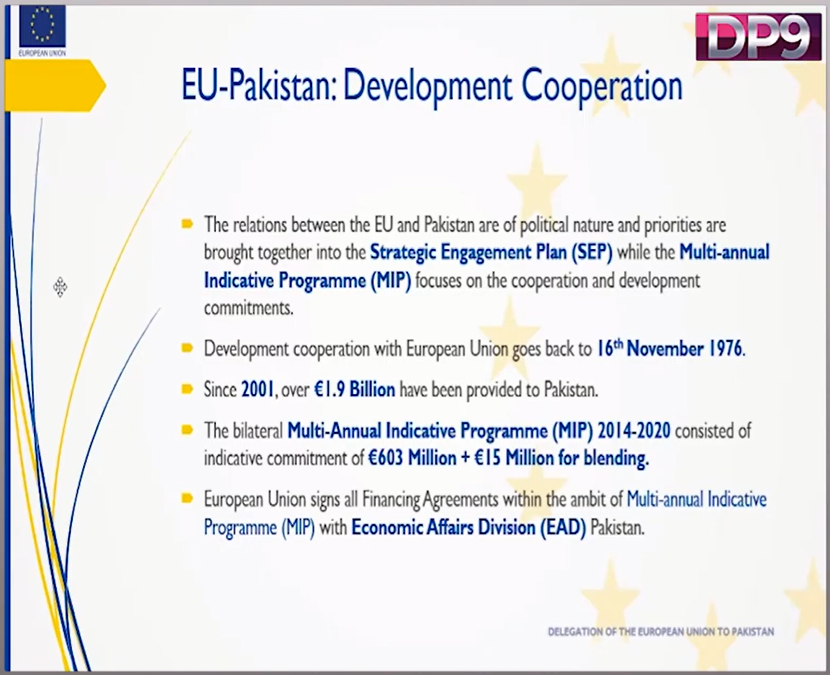
Just to say that apart from all the other things that we’re doing, we’re also very much involved in providing development cooperation funds to Pakistan. We have been providing about 100 million Euros of grants, underlying its grants and not loans. What we do here is, it’s not in the form of a loan, it’s European taxpayers money that goes in to providing and addressing needs in third world countries and trying to support the faster development of third world countries including Pakistan. We do this in development cooperation in a seven year plan. If you remember earlier, I was saying that the budget of the European Union is decided on a seven year basis. Within that budget there is a part which is for development cooperation and for each country there is a multi-annual indicative program which is defined. So we are in the process of now starting the next cycle. We’ve already defined with the government what the priority areas are and what we’ll be doing in a nutshell. For the future, we’ll be looking into sustainable green growth. We will be looking into providing support for vocational training and education. There is part of the funds that will go into supporting things like the rule of law. I have more detailed slides on all of these things but I think it’s better if I leave it here and then allow the questions. So overall what the EU is, and what are the key things we have been doing in Pakistan.
Ambassador Mustafa Kamal Kazi: Thank you very much ambassador for a very comprehensive presentation, and we really appreciate your gratification regarding the GSP plus program particularly in light of the resolution that was passed in the European Parliament. We hope now that the next 10-year cycle, which is due for Pakistan, the review cycle of GSP in next year will be as sympathetic as the EU approach has been in the past because for us, the COVID and a lot of other factors have put us in a difficult economic situation with regard to our exports. And the continuation of the GSP plus to the next 10-year cycle, it will be of a great relief to Pakistan and on the context of EU’s global role, I have a question.
There seems to be some contradiction in EU’s global role, on one hand we see emphasis within the EU on an assertive foreign policy, common security and defense policy, and on the other hand there is an urge to quickly fall in line with the US led positions on regional and global issues or crisis, even though those positions may not be always in the interest of some key EU countries/member states? I would mention the gas imports from Russia, China-US contest, and also the approach to the humanitarian situation in Afghanistan. So would you be kind enough to elaborate and to address this kind of impression and perception that prevails? Thank you.
H.E. Androulla Kaminara: Very pertinent and also timely question. The reason I paused and I think I went into a bit of detail when I was talking about the strategic compass for the EU is exactly that in the current geostrategic situation, it is quite obvious that the EU needs to strive for more independent action and to have the capabilities to take more independent action. If you look at the address of the Commission President to the European Parliament; once a year there is a state of the union address which the Commission president makes to the European Parliament and it takes place in September. If you look at what the Commission President said in that context, because it was in September and the events in Afghanistan took place in August. She does not shy away from the fact that we needed to have been able to act more independently in the situation in Afghanistan. The rapid push that has taken place to promote the strategic compass for the EU is exactly the realization that, of course we cooperate with NATO, with US, or other global bodies or global partners. In order for us to have a more strategic position, we also need to have our own capabilities, so that’s the one fact. The other fact, if we look at what is happening now vis-a-vis the situation between Russia, it is when the situation first hit the international news, the European Union was not very much in the picture and the European Union and HRVP were really adamant that there would be no discussion about security in Europe without the European Union at the table. So you have highlighted a number of things that in the past were not allowing us to be as relevant as we would have liked. And that’s where the strategic compass comes on the table now. With very much support from a lot of the member states, in order exactly to address those weaknesses that we have publicly aided. Thank you very much!
Now I move on to commodore Sadeed. If there are any questions from participants, let us know.
Mr. Sadeed Malik: There’s one question about the touristic destinations of Pakistan, and we have very few tourists coming from there while we have excellent tourist attractions in Pakistan.
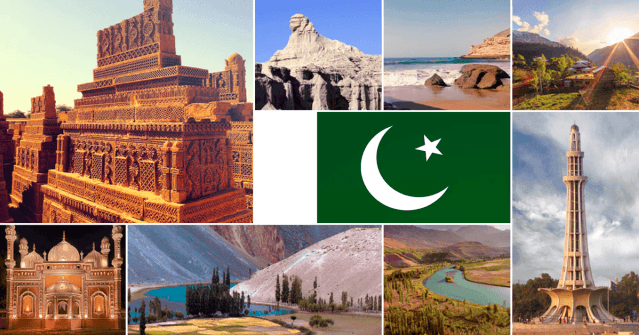
H.E. Androulla Kaminara: I am the first lover of the touristic attractions in Pakistan and great believer on the touristic possibilities for Pakistan. And the European Union also has been providing, in some cases, some grants in order to further promote areas. We have contributed to providing books or references or online material that would make touristic destinations in Pakistan more known. We also have to consider another aspect, we have here the ambassadors of the member states. We have 17 ambassadors of EU member states as well as myself as the EU ambassador chair, the coordination meeting between all the EU ambassadors in Pakistan but in certain parts of the country, ambassadors cannot go without NOCs, in some cases there is a reluctance among ambassadors to recommend that people come because one of the roles of a country ambassador is also to take care of its own citizens, if something goes wrong. In order to get access to the areas where the tourists go but the ambassadors cannot go, so I think this is something that Pakistan needs to consider.
Mr. Sadeed Malik: Cultural interaction ultimately leads to increase of trade transactions. There’s a suggestion which has come up in the chat that would it be possible to make some sister cities between European capitals and Pakistani cities like Lahore and Karachi?
H.E. Androulla Kaminara: This is of course possible, this has come up as a suggestion in the past. We can always do that, the question is to ensure the action we take will actually lead to more tourism. I think the key to having more tourism is more integrated touristic product, and secondly to be able to access the country more freely. I’ll give you an example of what I mean by integrated touristic product. I’ve been to some areas which are stunning in beauty, I mean really, the world should see a lot more of these places in Pakistan, but let’s say you go to the north, you travel there, and you go if you’re interested in mountain climbing. You can do that but normally when tourists travel they don’t just travel to do one activity, they will need to do some cultural activities also. They will need some restaurants and a better transport system. A lot of tourists are also very interested now in having ecological tourism- tourism that does not put a further burden on the environment. But then they would come and see places that are pristine and that their presence there would not cause any problem. I think I’ve seen that there has been improvement but I think maybe further work on those needs to take place. Another example I can also give is Pakistan I think, has five world heritage sites. One goes there and they are stunning. If one goes there, the normal services like a tourist would expect do not exist. In the sense that you can’t buy a guidebook, you can’t buy certain souvenirs, you go to the site there’s no linked touristic support there like restaurants or hotels. So a huge touristic potential remains unexplored.
Mr. Sadeed Malik: Mr. Abubakar Shamsi has raised his hand, requesting you to be brief
Mr. Abubakar Shamsi: Good morning everyone I’m Abubakar Shamsi from the Karachi Chamber of Commerce. I just had a very quick question that since we represent the largest Chamber of Pakistan which is basically the seventh largest Chamber in the world, a major question that most of our businessmen have is the duration of the visa that is issued to them. It is really not conducive to a good working business environment that after every three or four months they have to reapply for visas so my suggestion would be that EU come up with a better visa scheme. Something like the US has come up with. Almost all of our members get a five-year multiple entry visa every time they apply from the US, and that seems a much better idea and a much more conducive to the working environment of businesses.
H.E. Androulla Kaminara: I hear the request loud and clear, one of the slides that I had skipped was the EU-Pakistan Readmission Agreement. What we do on visas is the result of a bilateral agreement. We have annual discussions between Pakistan and the EU about this Readmission Agreement, and tied to that is also the travel between Pakistan to Europe and vice versa. This is something that has been raised on a number of other occasions. I have to say that the visa issues are a competence of each member state. We coordinate as the EU but its each member state. I know over the last couple of years, it’s been even more difficult because of the COVID issues. When we discuss with member states, this issue has come up repeatedly. We’re looking at ways of making days of travel of business people from here to the EU and vice versa, because there’s also problems of Europeans coming here.
Mr. Sadeed Malik: So this will be the last question from Mr. Shariq Vohra, one of our members of KCFR. Mr. Shariq Vohra please make it a very short question.
Mr. Shariq Vohra: First of all thank you very much Her Excellency. I know you visited the Karachi Chamber last year where we interacted with you. I have two questions, one is during your presentation, you mentioned that there will be version two for GSP plus in next three to four months, that means you will be coming with new restrictions and new facilitations for GSP plus and would that version two be shared with the private sector, so if there are any challenges for that we can respond, this is my first question.
My second question is that for us exports to European Union are really very important but side by side, I know for sure, that Pakistan was one of the biggest buyers of textile machinery during the last two years from the European Union. Probably the top three buyers of European machinery. Not that Pakistan through their export is helping but we have bought a lot of machinery from the European Union also, so you and the European Union member states should also appreciate Pakistan’s effort for balance of trade. Thank you!
H.E. Androulla Kaminara: I’ll start with the second question, of course the GSP plus is not a one-way trade regime, it’s a two-way trade regime. So Pakistan, has it managed to increase its exports to the EU? 65 percent since it was signed the EU also increased its exports to Pakistan. But I think it’s 48 percent if I remember correctly, so absolutely the GSP plus is a two-way trade regime.
You also have to know that granting zero import textiles into the EU sometimes has made them cheaper than textiles which have been produced in the EU. So basically, sometimes Pakistani textiles find a bigger market in the EU than EU produced textiles. And that is something that has to be borne in mind when somebody is discussing about what the next version is, and why should EU continue or not continue the GSP plus regime. On the three months, I think there was some misunderstanding. According to the GSP regulation, the European Commission, every two years, has to table a status report, an evaluation of where the country is in implementation of the GSP plus obligations. The last one we tabled was in February 2020. So the process for the next report has already started, and that’s why we will have a mission here, which after the mission the drafting will continue. So this report is a technical report, it says where we were before, where we are now. Some of the things are not numerical. For example, since we had x number of inspectors of factories, I don’t know what the number was, a hundred, it’s now 150 or it’s now 50. These are facts and these are facts which are received from the government. So it’s not that we make any of these things up. I underlined that the previous report that we issued, there was not one statement or fact that anybody would say were not correct. So there will be a factual report on progress made, progress not made, and what we’re looking at is not to go from zero to hundred, but to be on a trajectory of improving. I’ll give you one example, two reports back it said that Pakistan needs to have a National Commission of Human Rights.
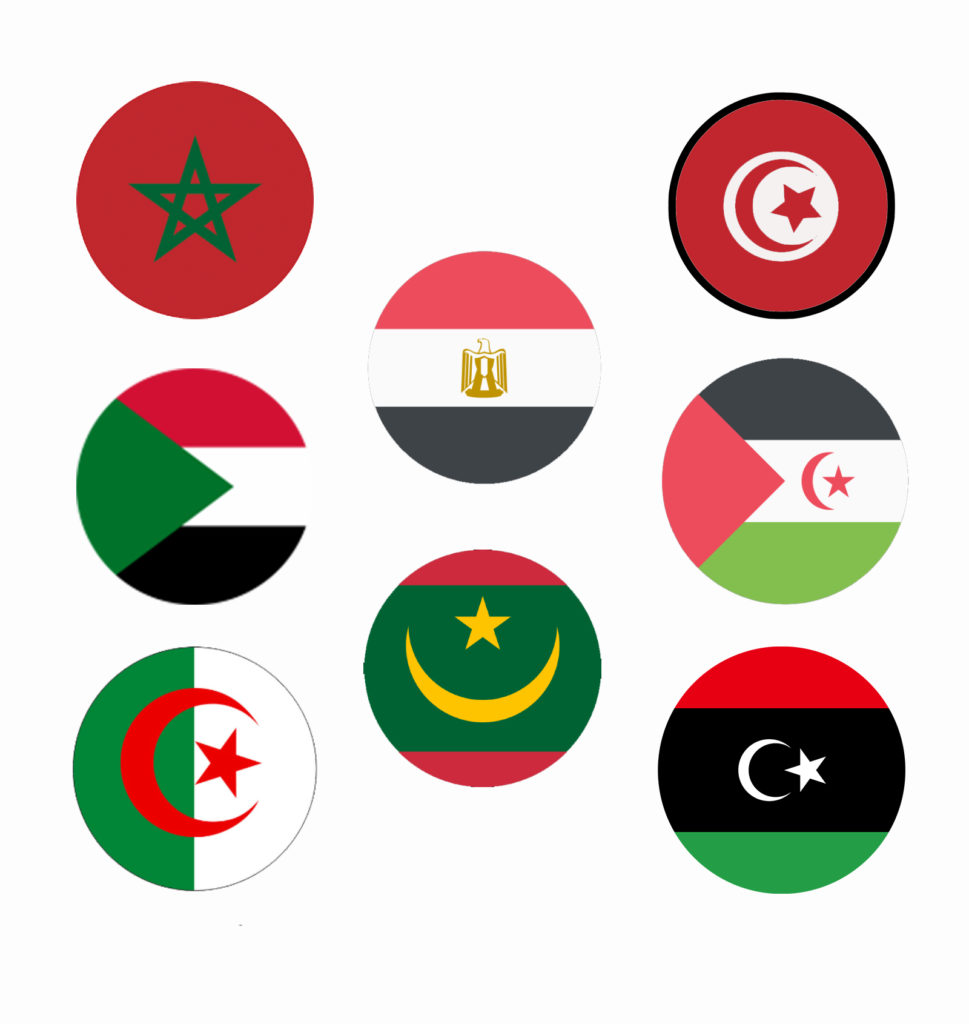
Mr. Sadeed Malik: Thank you very much! We are just running out of time as you have given us this one hour. May we now request our Chairman Mr. Ikram Sehgal for his concluding remarks.
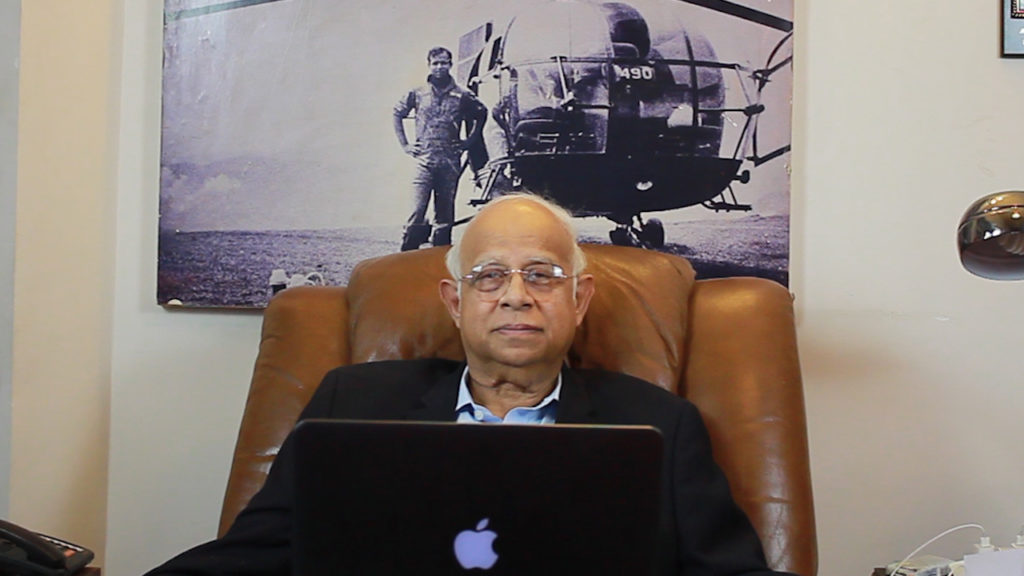
Chairman KCFR Mr. Ikram Sehgal: Excellency! Thank you very much for being with us today, and it has really been a privilege to listen to you, and to hear a comprehensive presentation on the EU-Pakistan diplomatic and economic relationship. I have a few points, since you know, the first European landed here in 1498 Vasco de Gama and after that you know, all the trade has been through sea, not much has been done through land which has been there but not in a very sophisticated manner.
One part of the presentation which I feel that needs looking at is the two corridors that link up, other than the China-Pakistan Economic Corridor. Because as you know the World Economic Forum has included Pakistan in the Eurasia sector, other than the MENA sector, the Middle East North Africa sector, and that is because of the presence of Gwadar on the Indian Ocean and therefore other than China-Pakistan Economic Corridor, there are two other important corridors. One is the North-South corridor from Russia in the Central Asian States into Gwadar, and the other one is the corridor which is the old RCD highway, which connected Pakistan through Iran and Turkey to Europe. These corridors are very much in existence, they are actually capable of working today. It shortens the distance for trade, it shortens the distance of the economic relationship in the sense that trade charges become much less and moreover it is door-to-door. So if you put a container in Karachi, you can take off the container in Brussels or Rotterdam, or you can take off the container in Barcelona for that matter. So that is something that I think would be nice to have discussed more. Because I think there is a European interest now in using this fundamental access to the Indian Ocean, which comes through, and which now, with more peace coming to the region in this area it’s a more feasible option. The other thing Excellency, which I must point out to you is, I know for certain that the European Union is very interested in financial inclusion like the World Bank financial inclusion in the Sustainable Development Goals, and particularly women’s empowerment. As you know women do not have access to bank accounts, etc. and a lot of work is going on in Pakistan in this respect and I’m sure you must have studied it. I think that is something that needs to be discussed further because certainly the European Union can, because of your contention to human rights and this financial inclusion of women is part of human rights. So I think whatever help that you can give in that respect would be fine. I would take this opportunity to request a further dialogue with you pending your visit to Karachi and so we would like you to come and discuss it. Excellency, again I thank you very much, it’s very kind of you. Actually, the Secretary General has dragged me in to attend this from Dubai, I am in Dubai and I am supposed to come back tonight but he said no, you must attend it and I am very honored and privileged that I have attended this session.
Thank you very much, Excellency.




